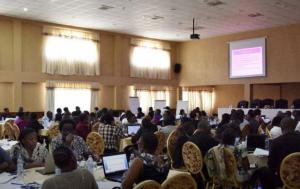Day One Bulletin: African Regional Workshop on HIV in Children and Adolescents
Entebbe, 15 September 2015:- The African Regional Workshop on HIV & AIDS in Children and Adolescents has today opened at Imperial Golf View Hotel under the theme “Stepping up the case for HIV & AIDS care and treatment among children and adolescents in the African Region”, to review country progress in addressing HIV among children and adolescents.
Speaking on behalf of the World Health Organization Country Representative, Dr. Nanyunja Miriam, officially opened the workshop on a good note by thanking all the AIDS development partners for the support rendered to the government. She pointed out the need to improve maternal health services and increased access to Antiretroviral Treatment (ART) for children. Giving a summary of HIV & AIDS in children and adolescents in Uganda, Dr. Miriam said that HIV related mortality is highest among 10-19 years age group in Uganda. The drop in new infections from 2.3 million to 1.4 million and in children from 480,000 to 190,000. She concluded by emphasizing the need to address community mobilization and stigma.
During the workshop, Dr. Musa Bungudu, the UNAIDS Country Coordinator called for a unified effort to tackle HIV & AIDS in children and adolescents. He also decried the practice of denying children ART and saying every child has a right to live. He also said that AIDS is highest in Sub-Saharan Africana and called on governments and all partners to send out the most appropriate message. He also called on governments in African to prioritize the HIV & AIDS to reduce over-dependency on donor funds.
Dr. Anurita Bains who spoke on behalf of the UNICEF country representative stressed the need to give HIV & AIDS in children and adolescents more attention. She said that government should take the lead and partners provide appropriate support to achieve the 90-90-90 treatment target that intends to have 90% of all people living with HIV to know their HIV status, 90% of all people diagnosed with HIV infection will receive sustained antiretroviral therapy and 90% of all people receiving antiretroviral therapy will have viral suppression.
Strategic Investment for children and adolescents
Dr. Biziwick Mwale from the UNAIDS African Regional office presented a case on strategic investment for children and adolescents highlighting the initiatives and opportunities. He said that addressing HIV & AIDS is one of the smartest investments in global health. Since the year 2000 $187 billion has been invested in fighting the scourge of HIV with United States of America investing 45% of that amount. He however said that Africa needs to allocate more funds to fighting HIV & AIDS. The need to focus on humans rather than disease was also espoused by Dr, Bizwick. He referred to Dr. Mark Dylub, the Global Fund Executive Director’s sentiments that person-centric investment is more effective than disease-centric in trying to reduce the burden of HIV & AIDS in children and adolescents.
Integrated HIV Prevention for adolescents
Dr. Susan Kasedde, said that new infections are falling among children under 15 years than among other adolescents and young girls. She however said that 80% of all adolescents living with HIV are in Eastern &southern Africa adding that nearly 60% of all new infections are in six countries; South Africa, Indonesia, Uganda, Kenya and India. Dr. Susan further said that there is need, to define who the target populations are and reach out ton them in order to reduce the HIV burden saying we need to have greater shared responsibility and accountability as well as argue for increased domestic investment by the affected countries.
Day one of workshop ended on a good note with, participants dividing between two groups; pediatrics and adolescent health experts. Dr. Barbra Asire, Ministry of Health, Uganda and Dr. Lebo Madisha from the Ministry of Health, South Africa presented their interventions on HIV in children and adolescents to the different groups respectively. Dr. Barbra noted that Uganda has trained peer educators and teachers as well, to enable them to reach out to the different age groups. She also stressed that advocacy is a key issue Uganda has embarked on. Dr. Lebo said that South Africa designed a web portal; that disseminates information to the different age groups depending on one’s age. Despite some challenges, the presenters felt that their respective countries have achieved a lot and are committed to addressing the challenges.
_______________________________________
For more information, please contact:
Mwebembezi Edmond, Public Information Officer, Tel.: +256 414 335569, Cell.: +256 782 962674, Email:mwebembezie [at] who.int (mwebembezie[at]who[dot]int)



